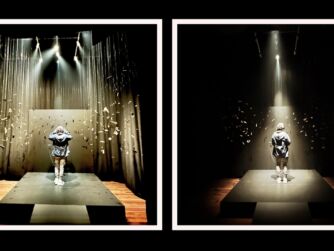Virtual reality developers and enthusiasts have been waiting for Oculus to give some clarity on their default input solution, and today at their pre-E3 press conference they made some key announcements. The first is that CV1 will be shipping with a wireless Xbox controller, which means that VR developers for the Rift can rely upon having at least what has already been the industry standard input controller. The second key announcement is that Palmer Luckey showed off the Oculus Touch input controller prototype, which won’t be shipping until later in Q2 of 2016.
The Oculus Touch won’t be ready in time for the consumer launch, which creates some user input fragmentation within the VR experiences that developers are creating. There are some serious design design decisions that have to be made, and so VR developers will unfortunately have to design for both rather than picking the controller that’ll work the best for their game.
The lighthouse controllers with the HTC Vive will be launching in the holiday season of 2015, which means that the only outlet for full two-handed interactions and 3DUI will be with Valve’s HMD up until the middle of 2016. Hopefully the second consumer release of the Rift of CV2 will eventually ship with the Oculus Touch controllers so that Rift developers can rely on a standardized default 3DUI input solution.
LINKS:
- Watch the Oculus Press Conference
- Oliver Kreylos on there being no one-size fits all VR input solution
- VR dev and enthusiast reactions to the Xbox and Oculus Touch News in Convrge
- Devs react: Oculus debuts consumer Rift, teases motion controller
- Reddit discussion about Oculus Touch
- Bundled Xbox controller announcement reaction Part 1 (Pre-Oculus Touch announcement)
- Bundled Xbox controller announcement reaction Part 2 (Pre-Oculus Touch announcement)
Become a Patron! Support The Voices of VR Podcast Patreon
Theme music: “Fatality” by Tigoolio
Subscribe to the Voices of VR podcast.
Rough Transcript
[00:00:05.452] Kent Bye: The Voices of VR Podcast. My name is Kent Bye, and I'm the host of The Voices of VR Podcast. And I'm here today just to go over some of the discussions that have been happening within the virtual reality community about some of the big announcements from Oculus today in a press conference leading up to E3. So the big news of the day, two things. One is that Oculus said that they're going to be releasing an Xbox wireless controller shipping with all the riffs. That means that anybody that's developing a VR game can rely on knowing that they will absolutely have a gamepad. This is great just because we know that Not everybody's going to have a gamepad, and so if you buy a Rift and you get it, then you can at least target that can be a minimum amount of input. Now, there's been a lot of debate within the VR community in terms of contrasting what Vive is doing with the Lighthouse controllers, where it's fully tracked in a 3D space. You get a much more immersive experience when you actually have your hands in the game. However, I've done interviews with people talking about, you know, it's going to be fatiguing to keep your hands up that much. That doesn't mean that it's not going to be great in the future, but going to the gamepad is a pretty safe bet. Oculus is not going to be developing and designing their own new controller. They're kind of going with, in some ways, an industry standard for controllers for what people are already using a lot. And so, in some ways, this is a relief for some developers. And in other ways, it kind of creates this input fragmentation dilemma for a VR developer. it kind of is a pretty huge difference to design an interaction using a gamepad versus using your fully tracked hands. So because the Vive is coming out here in the fall, then some people may have to make a decision to say, well, you know, I'm not going to design this for kind of this more controller that's really meant for interacting with the 2D screen rather than having fully interaction of a stronger sense of presence, quite frankly, when you have your hands in the game. So I see a lot of kind of splits within the VR community. Some people on Reddit were posting to Avar Kralos who at SAVRCon was saying that there's no one input solution that's going to rule them all, that you really do need a wide variety of different input solutions. Oculus has also announced, actually, they've been working on a 3D UI controller called the Oculus Touch. And it's got this sort of ring around it, and they claim it can actually track some fingers. And the great thing about that is it actually has physical buttons, which I have been a pretty strong advocate for because not having buttons can kind of create some fatiguing interactions, I believe. And so it's just going to be more efficient and certain that when you push the button, you know something is going to happen. You know, it's said with speech recognition that sometimes it could work for, you know, 90 to 95% and it's those 5% that it doesn't work that can be super frustrating. So when you're doing interactions and you're trying to do a gesture control and it's not quite picking up, then it could just be really frustrating. So I'm super glad to see that. Oculus has gone to this kind of hybrid solution of being optically tracked with what they're calling the constellation tracking They have this kind of invisible LEDs within the Crescent Bay HMD which is going to be able to allow the fully moving around and tracking the positional tracking of the headset turning all the way around 360 and But they also have these LEDs within the touch controller, so there's going to be an optical track component, but also with the physical buttons. So it's this kind of hybrid solution that they're going with. Now, in terms of the timing, Palmer Luckey said on Twitter that we won't expect the Oculus Touch to be shipping until the first half of 2016, which could be as late as June, the end of June of next year. There's been no indication at this point in terms of the developers when we're going to get our hands on some of these controllers for development Palmer said that the availability for Getting one of these touch controllers will more information will be announced as soon as the pre-orders for the cv-1 go on sale Which is presumably going to be sometime next week at e3 but that doesn't give any indication in terms of whether or not there's going to be sort of a a round of getting prototypes into developer's hands to start working with this and to design games and interactions. Because if they don't ship it anytime before next year, then there's going to be essentially no time for developers to really develop the user actions that they would need to in order to actually use these touch controllers. So, a lot of split within the VR community, you know, we're really facing, depending on what Sony comes out with next week with the, they've been traditionally using the Move controllers, but already we have the fragmentation within Oculus, having to decide whether or not to do a gamepad or a touch, because it really can create all different types of, range of user interactions. The Oculus Touch is probably more similar to something like the Vive, being able to track in 3D space and have buttons. And contrasting to Leap Motion where there's no buttons, it's just tracking your hands, but there could be some similar kind of interactions there in that same spectrum. So we'll kind of see where Leap Motion kind of ends up in this. The other end is the Xbox controller and then the Move controllers which could kind of be more on the side of both the Vive and the Oculus Touch. So where does that leave different manufacturers like the Stim controller? Well, we don't know in terms of, it seems like the Oculus Touch could be shipping even before the Stim. So, as much as that magnetic tracking is very expensive, but like Oliver Coyle said, there could be some use cases where the stem is superior in terms of being able to track things in a 3D space. So, we'll see. I mean, I'm not completely discounting it. It could just move from the consumer into the more industrial use cases. So, it's yet to be seen. So that's kind of like an overview, a quick hit for some of the big news in terms of the big discussions within the VR community, seeing both sides. Some people are super happy, you know, that at least they have an answer and they can target something, and something that's proven, something that works. Like again, I said, it's going to be a non-fatiguing interaction, so people know that they're going to be able to use a controller for an extended period of time. That's still yet to be seen of how long someone could use something like the Oculus Touch or the Vive controllers. It could turn out that we need more of a bursting behavior, where you're able to kind of sit down in a resting pose, and then when you're ready to interact with the 3D space, then you would raise your hands, kind of like how we do in real life. Some of the interesting things that Palmer mentioned in terms of the touch controllers is being able to track the fingers and do kind of gestural controls. That'll be really interesting to see. He mentioned specifically that it's going to be super important for social interactions. And so if you imagine something like the Vive where you don't have the freedom to be able to kind of do like finger gestures, The way that Oculus Touch is set up, it could be a little bit more dynamic in terms of expression. And because Facebook obviously bought Oculus, then they're going to have a keen interest of doing social interactions. So it could be interesting to see how that actually plays out when they have what Palmer says is the toy box demos there at E3. Kind of like a sandbox for all the different things that you can do with these controllers. So we should be getting some more information on that. There are some other announcements in terms of games as well as being able to stream Xbox into the console. Basically, you know, have a kind of a virtual cinema theater where you're looking at a TV screen but playing video games on it. Being able to stream Xbox games into a virtual environment like that so you can have like big screens and kind of your own personal environment for playing video games. So there seems to be a collaboration between Oculus and with Microsoft on that front. So it's yet to be seen if that's a marriage of convenience as some people have been calling it in terms of the connection there between Facebook slash Oculus and Microsoft and whether or not Microsoft will continue to develop anything in virtual reality and whether or not there'll be more of a solutions coming forth from Oculus in terms of their software and distribution, which I imagine they will continue to do that independently. So that's sort of the big hits that I saw today as I'm sort of looking at all the different coverage and discussion. Like I said, it is a bit of a controversy. We'll see some of the hands-on reactions from E3, but it will be some time before we get an input solution from Oculus that includes a full 3D UI. That means that Vive launching in the holidays is going to have a bit of a head start in terms of the VR experiences that are even possible. anywhere from four to six months worth of content being out there and available that Having just a controller alone is not going to be enough and so and also as for VR developers it's a little bit of a decision as to whether or not you absolutely need the touch controllers or if this is something that's going to really take off and And, you know, you may design something and people may not have to buy this extra peripheral, we don't know how much it costs, anything like that. So, you know, in some ways it would have been great if Oculus would have said, yeah, in the box you get both of these controllers, that way developers would know for sure that they'd be able to do both and integrate both. But at this point you kind of have to make a decision to try to still maintain both rather than choosing one or the other. So with that, thank you for listening. And if you are interested in supporting the Voices of VR, please consider becoming a patron at the patreon.com slash Voices of VR. Thanks for listening.





